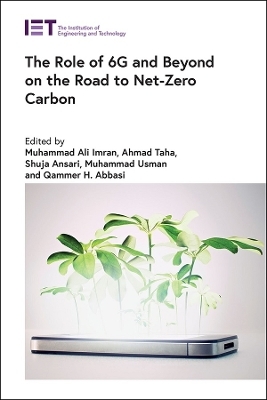
The Role of 6G and Beyond on the Road to Net-Zero Carbon
Institution of Engineering and Technology (Verlag)
978-1-83953-736-3 (ISBN)
- Titel nicht im Sortiment
- Artikel merken
The previous generations of mobile connectivity have already played a crucial role in reducing emissions through such means as smart metering and remote working. Numerous studies have highlighted how vital 5G technology is in mitigating climate change and accelerating the way to net-zero. This is due to the potential 5G technology has in bringing increasing data rates, massive machine type communication, and ultra-low latency. As 5G is rolling out, researchers are researching how the 6th generation of mobile networks (6G) will take the advantages of 5G even further.
This book focuses on the potential of 6G to further expedite the achievement of net-zero. The authors cover the latest research efforts made in utilising 6G technology to solve real societal problems and to thought provoke researchers and scientists in proposing innovative ideas on how 6G can help with the fight against climate change.
The book is geared towards researchers, engineers, scientists, technology professionals and advanced students in the fields of wireless communication, energy management, green tech and sustainability with a focus on net-zero carbon. It will also serve as an advanced textbook for postgraduate students in mobile communications and energy-related disciplines, and it will be useful to policy makers, 5G and 6G stakeholders, regulators, institutional actors and research agencies to support them in incorporating green sustainable mobile communication networks in their plans for net-zero targets.
Muhammad Ali Imran is a professor of Communication Systems, dean of Transnational Engineering Education and head of the Communications, Sensing and Imaging hub at the University of Glasgow, UK. He is also affiliate professor at the University of Oklahoma, USA, visiting professor at the 5G Innovation Centre of Institute for Communication Systems at the University of Surrey, UK and affiliate research professor with the AI Research Centre of Ajman University, UAE. He has grant portfolio of £20M+ and published 600 journal and conference papers and edited/published 13 books. Ahmad Taha is a lecturer in Autonomous Systems and Connectivity at the James Watt School of Engineering, University of Glasgow, with over a decade of experience across esteemed higher education institutions spanning Egypt, the UK, and China. His research journey centres on cyber-physical systems for energy management and digital healthcare. Dr. Taha has authored/co-authored over 35 publications showcased in reputable venues and has contributed as a Principal Investigator/Co-Investigator to research grants exceeding £350k in value. Dr. Taha has earned recognition from the Royal Academy of Engineering through the Global Talent scheme, he is an inaugural member of the UK Young Academy and an academic advisor to the Commonwealth Scholarship Commission. Dr. Taha holds the title of Fellow of Advanced Higher Education (FHEA) and is among the pioneering UKCGE recognised Associate Supervisors. Shuja Ansari is a lecturer in Autonomous Systems and Connectivity Division at James Watt School of Engineering, University of Glasgow. He has over a decade of experience in telecommunications focusing on Private and Public Mobile Networks, Radio Access Technologies, and their applications. He is a chartered engineer and the 5G use case lead for the Wave-1 Urban 5G project funded by the Scotland 5G Centre. He is also the Glasgow Principal Investigator for the UK Electromagnetic Environment Hub. His research interests include wireless communications, systems integration, terrestrial/airborne mobile networks, security and privacy in communications and Internet of Things (IoT). Muhammad Usman is a lecturer and programme leader in the Department of Electrical and Electronic Engineering at Glasgow Caledonian University (GCU). Before joining GCU, he was a research associate at the University of Glasgow, UK, in the Engineering and Physical Sciences Research Council (EPSRC) funded COG-MHEAR programme grant. This transformative research aims to re-design current hearing aids and assistive technology, where his role was to integrate end-user context in visually-assisted hearing-aid design in a privacy-preserving manner. He is endorsed by the Royal Academy of Engineering as Global Talent. He holds a Ph.D. degree (cumlaude) in information and communication technologies from the University of Trento, Italy. He has an exceptional research output record in the field of 5G and beyond 5G cellular systems, radio frequency (RF) sensing, network security, Internet-of-Things (IoT) and developing intelligent systems for healthcare sector. Qammer H. Abbasi is a professor with the James Watt School of Engineering (JWS), University of Glasgow, deputy head for the Communication Sensing and Imaging hub, lead for Connecting People theme at JWS and deputy theme lead for Quantum technology in the University's Advance Research Centre. He has grant portfolio of £10M+ and published more than 450 journal and conference papers and edited/published 11 books.
Chapter 1: The role of mobile communication in achieving net zero: the current status
Chapter 2: 6G radio hardware - contributing to the net-zero target
Chapter 3: The role of 6G and beyond for urban air mobility and utilising space systems for road to net-zero carbon
Chapter 4: Sustainable RF wireless power transfer and energy harvesting and their applications
Chapter 5: Long distance power transmission
Chapter 6: Energy-efficient architectures for 6G networks
Chapter 7: Energy-efficient UAV communication and deployment
Chapter 8: Cooperative intelligent transport systems for net-zero
Chapter 9: Intelligent reflective surfaces (IRSs) for green networks
Chapter 10: Energy efficient optical receivers for next generation non-terrestrial communication networks
Chapter 11: The role of 6G in green energy generation
Conclusion
| Erscheinungsdatum | 05.12.2023 |
|---|---|
| Reihe/Serie | Telecommunications |
| Verlagsort | Stevenage |
| Sprache | englisch |
| Maße | 156 x 234 mm |
| Themenwelt | Naturwissenschaften ► Biologie ► Ökologie / Naturschutz |
| Technik ► Nachrichtentechnik | |
| ISBN-10 | 1-83953-736-1 / 1839537361 |
| ISBN-13 | 978-1-83953-736-3 / 9781839537363 |
| Zustand | Neuware |
| Haben Sie eine Frage zum Produkt? |
aus dem Bereich


